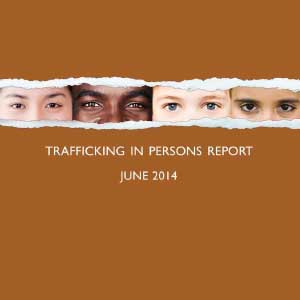
The State Department’s Trafficking in Persons (TIP) Report is one of the best tools to understand the breadth of modern slavery. It also provides a key means for holding countries around the world accountable for their role in combatting human trafficking. In addition, the fact that it also reports on the United States is a helpful benchmark in assessing U.S. efforts to combat this human rights scourge. The report’s efficacy, as I noted last year, is linked to the integrity of its reporting. With several key countries subject to an automatic downgrade this year, the trafficking community watched closely to see whether geopolitical concerns would trump the facts.
This year’s report, released last Friday, once again demonstrated that the United States is continuing to base its assessment on the facts. Thailand and Malaysia, two countries key to the Administration’s rebalancing strategy in Asia, were downgraded to Tier 3 and are now subject to sanctions later this year. Two key countries that were downgraded last year, Russia and Uzbekistan, remained on Tier 3. Other countries of importance to the U.S. were also downgraded, including Qatar, which has been facing increasing reports of forced labor. The Trafficking in Persons Office and its leader, Ambassador Luis CdeBaca, should be proud of the work they have done in maintaining impartial analysis as the key to conclusions in the report.
We were particularly gratified to see Ambassador CdeBaca highlighting modern slavery in the seafood industry during the report’s launch. He indicated that more than 50 countries in this year’s report included abuses in the fishing industry. The exploitation on board fishing vessels and in shrimp processing shacks in Thailand—recently reported by a HU-supported reporting in The Guardian—is one reason it deserves its Tier 3 ranking.
Yet, much more remains to be done, including in the U.S. itself. While the State Department gave the U.S. a top “tier 1” ranking, it recognized that that there is still a distance to travel here at home. As Secretary Kerry noted, “…supply chains are not just product lines. They represent lines of responsibility. And we each have a responsibility to make sure that the goods we buy [are] free of forced labor.”
Now, many of us are waiting to see the forthcoming implementing regulations for the Executive Order Strengthening Protections against Trafficking in Persons in Federal Contracts. Ensuring that the regulations fully implement the President’s intent to stamp out trafficking in federal contracting is critical for the U.S. to maintain its leadership position, as is making sure that the training and other elements in the Order are fully implemented. Moreover, while there has been appropriate focus on the Department of Defense, all agencies need to make sure that no federal dollars buy goods or services tainted by modern slavery.
The 2014 TIP report is another positive step in the fight against modern slavery and an opportunity for us to see where progress has been made and where more must be done. We’re glad the U.S. has taken a critical look not only at other countries but also at itself. Now, we all must redouble our efforts to build partnerships and implement solutions.